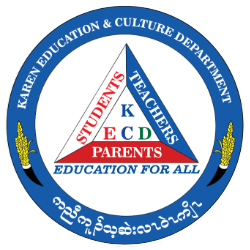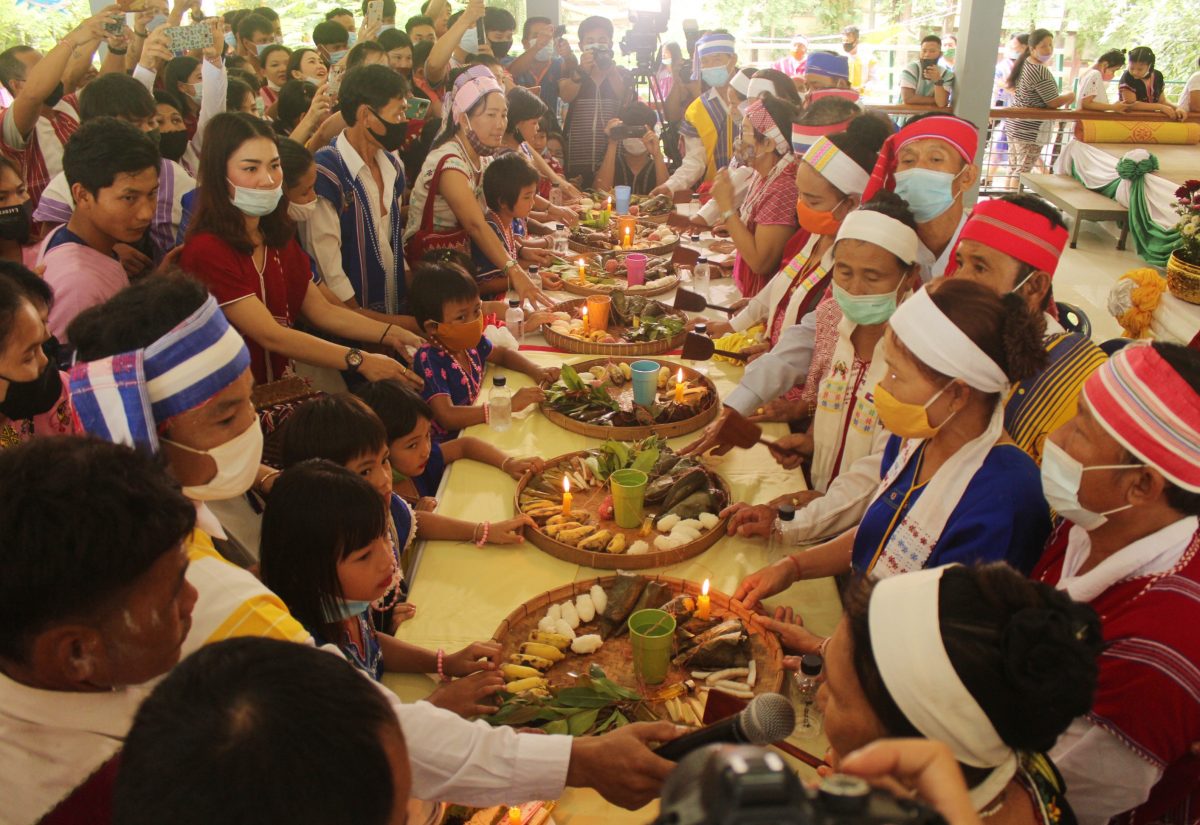What We Do
Management Teams
The Central Education Commission (CEC) is the highest decision-making body of KECD, and directs its overall direction. CEC comprises of:
- Senior Management Team (SMT) and,
- District Education Officers (DEO)
The SMT is responsible for the operational decision-making of KECD. It leads, manages, monitors and evaluates the operations of the bureaux and their activities. It is also responsible for establishing the organization’s rules and regulations, and reviewing and developing the organization’s policies and procedures. It represents KECD’s external and internal relations between donors, partners and local communities and their leaders, builds networks with regional, national and international education actors and policy makers, and advocates the work of KECD with the Burma government in building access to appropriate, effective and transferable education for the Karen people.
The DEOs make decisions at the district level on issues related to education affairs. They also manage and plan education activities in collaboration with KECD SMT. They provide advice to school heads, trainers, and work with parents and the community.
Bureau of the Secretary
The Bureau of Secretary is the main administrative body of KECD. It has a broad range of responsibilities including the formation of the Central Education Commission and its functions, managing and supporting the works of the District Education Offices through its four main program teams:
- Finance Team
- Administration Team
- Monitory and Evaluation Team
- Organization Development Team
The four program teams are responsible for:
- Fundraising and financial management
- Policy development, implementation and compliance, including Child Safeguarding
- Monitoring Evaluation, Assessment and Learning
- Documentation and data storage, Report writing
- Program delivery logistics
- Human resources
- IT and publicity
Bureau of Basic Education
The Bureau of Basic Education follows a twelve-year education system which is divided into four stages covering:
- Lower primary (Grades 1 to 3)
- Upper primary (Grades 4 to 6)
- Lower secondary (Grades 7 to 9)
- Upper secondary (Grades 10 to 12)
Students study 8 core subjects: Karen, Burmese, English, Mathematics, Science, History, Geography, and Social Studies.
As of the 2023-2024 academic year, there are 1,233 schools with 109,313 students enrolled and 7,946 teachers serving at these schools.
The Bureau of Basic Education oversees three main programs so that education in KECD reaches its quality standards:
- Curriculum and Learning Standards Unit:
- Textbook writing, reviewing, updating, and upgrading of school curriculum framework and teaching and learning materials.
- Observing schools, conducting student learning assessments, and evaluating exams tools and procedures.
- Developing and reviewing board exams policy, curricula, and exams.
- Assessing yearly learning and teaching materials for context appropriacy and relevance for board exams (conducted at Grades 6, 9, and 12).
- Training Unit:
- Providing continuous professional development for trainers and teachers.
- Delivering subject specific teaching skills and methodology.
- Conducting school leadership and management training to school principals, school committee members, experienced teachers, and school administrators.
- Broad-based Capacity Development Unit (BBCD): There are two main activities under BBCD:
- Mother Tongue-Based Multilingual Education (MTB-MLE): The program supports and strengthens curriculum development by producing mother tongue- based textbooks writing, ethno-art teaching, learning materials and tools for primary level schools.
Bureau of Community Engagement and Learning Support
There are five main programs under this bureau:
- Parent-Teacher Associations (PTA) – The program is responsible to build strong relationships between parents, teachers, principals and school committees for the well-being of students, their learning and for the wider development of the role of schools in their communities. It aims to enhance parents’ engagement in school programs and activities such as participation in meetings and decision-making, and consultation and involvement in social action such as fundraising and income generation. Under the Bureau of Special Project, (140) PTAs have so far been established in KECD schools. The program aims to set up PTAs in all schools under the KECD’s administration.
- School Health Program – This program is led by a consortium of KECD, Karen Department of Health and Welfare (KDHW), Back Pack Health Worker Team (BPHWT), Burma Medical Association (BMA) and Mae Tao Clinic (MTC). It aims to promote the wholesome physical, social, emotional and educational growth of students and school staff by providing health education and services, including disease prevention. The program is currently at the stage of finalizing its “School Health Policy” manual before activities are implemented.
- School Infrastructure Program – This program provides school building support that is under the administration of KECD, following the established guidelines for standard school infrastructure. Additionally, the program provides training on school construction and maintenance to members of the school construction committee.
- School Improvement Unit – The program strengthens school external activities such as building constructions and classroom facilities for teachers and students, and school internal activities covering teaching quality and institutional management and leadership and strengthening community participation.
- School Inspection Unit – This unit conducts monitoring and visits to gather feedback from schools such as school infrastructure, the teaching and learning process, and other school requirements. This information is then shared with other units to address the identified needs within the community and bridge the existing gaps.
Bureau of Special Projects
- Vocational Training Program – The program provides technical and vocational training skills to adults who haven’t completed their higher or upper secondary basic education that will enable them to build their future careers. This is conducted in partnership with ADRA Myanmar. Currently in 2020, we have set up a vocational training program called “K’Paw Htaw Technical and Vocational Education and Training Center” in Noh Poe village, Kaw T’Rit Township, Doo Pla Ya District. The program focuses on three areas: Sewing, Motorcycle Repair and Hairdressing. It aims to recruit 25 students per course, and accepts two batches of students per year. Adults between the age of 16-45 from the 7 districts in SE Burma can enroll in this vocational training course.
- Non-Formal Education (NFE) – Also in partnership with ADRA Myanmar, in 2020 we established a NFE Learning Center in Dae K’Hee village, T’Nay Cha Township, Hpa An District to provide education opportunity to Out-of-School Children and help them to (re)join mainstream schooling. Children between the age of 10-16 years can join the learning center. There are 32 students enrolled in this 2020-2021 academic year. The learning center operates from Monday to Friday mornings providing four subjects: Karen, English, Burmese and Mathematics.
- Library Program – The program is still under discussion and further updates will be provided in due course.
- Education in Emergency (EiE) Program -This program provides support to schools affected by the ongoing conflicts in Karen State through close collaboration with other departments within the KNU, operating under the umbrella of Community-Based Organizations (CBOs) and Civil Society Organizations (CSOs). The collaborative effort aims to address the urgent educational needs arising from the conflict situation
- Boarding House Program – The program is operated by the Karen State Boarding House Working Group (KSBHWG) comprising of:
- Karen Education and Culture Department (KECD),
- The Mae Taw Clinic (MTC),
- Karen Women’s Organization (KWO),
- Karen Youth Organization (KYO),
- Committee for Internally Displaced Karen People (CIDKP),
- Partners Relief and Development Thailand (PRAD),
- Karen Environmental and Social Action Network (KESAN),
- Karen Office of Relief and Development (KORD),
- Kawthoolei Agriculture Department (KAD),
- Karen Legal Assistance Center (KLAC), and
- Karen Student Networking Group (KSNG).
The purpose of this program is to provide a safe, healthy, secure and caring physical space and environment to students and orphans who live far from their schools to have access to education. To guide the operations of the boarding houses, in addition to compliance with all KECD’s policies, additional emphasis is placed on our child protection and safeguarding policy and procedures. Trainings on child protection are provided to all boarding houses managers and staff to ensure that these children are protected from all types of harm and abuse. In 2020-2021, under KSBHWG’s operation, there are 15 boarding houses caring and supporting the needs of 906 children and youth from different districts.
Bureau of Higher Education
The Bureau of Higher Education provides quality education at tertiary level that develops and equips students and faculty members for the needs of their communities, civil organizations, and the nation as a whole.
The Bureau of Higher Education delivers five core activities:
- Trainings and workshops
- Curriculum development
- School visits and monitoring
- Materials distribution
- Internships
Currently, there are 20 schools under the Bureau of Higher Education. These schools are classified into two categories: Institute of Higher Education (IHE), and non-Institute of Higher Education (non-IHE). Schools under IHE follow a standardized curriculum and education policy and system, and are managed by the KECD’s Bureau of Higher Education, whereas non-IHE schools operate independently with their own curriculum and follow their own education policies and systems. The Bureau of Higher Education works closely with the KRCEE in the higher education sector.
Bureau of Culture
The purpose of this Bureau is to preserve, strengthen and enhance Karen culture, traditions and identity. In the past, due to a lack of human resources, the program was unable to establish itself. However, in 2019, it was officially designated under KECD as one of its key components. A management committee is currently being formed to guide the implementation of the program.

